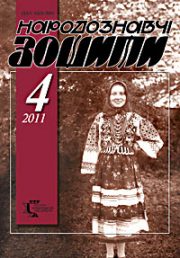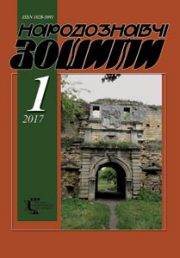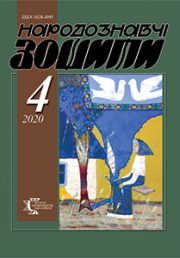The Ethnology Notebooks. 2018, 3 (141), 599–607
UDK 398.8(477.83):801.81
DOI https://doi.org/10.15407/nz2018.03.599
HREE SONGS FROM FATHERS` CHANT
Kyrchiv Roman Fedorovych – scientist-folklorist, ethnologist and literary scholar, doctor of philological sciences (1980), professor (1994), full member of the T. Shevchenko Scientific Society (1992), academician of the Academy of Sciences of the Higher School (1997), Honored figure of science and technology of Ukraine (2008). (Died 7 May 2018)
Abstrakt. The three songs that were sung by Teodor Kyrchiv, a native of the village of Korchyn, now Skole district of Lviv region, the head of the church and village choir «Prosvita», the father of Professor Roman Kyrchiv, are analyzed. These songs belong to the old part of Ukrainian folk songs, which in our time almost completely departed from the oral tradition, fell out of memory even of its oldest carriers. Involvement of theirs texts in the research discourse, the given information and observations is an incentive for the continuation of scientific research and in-depth understanding of the content, poetic, melodic essence and cultural and communicative role of these and other folk songs in the ethno-national space of Ukraine.
Keywords: father, song tradition, distribution geography of expansion, village Korchyn.
Received 23.02.2018
References
Bojkivschyna. Istoryko-etnohrafichne doslidzhennia. (1983). Kyiv: Naukova dumka [in Ukrainian].
Hrinchenko, B. (1907). Slovar ukrains’koi movy. (Vol. 1). Kyiv [in Ukrainian].
Dej, O.I. (1986). Ukrains’ka narodna balada. Kyiv: Naukova dumka [in Ukrainian].
Lysenko, M. (ed. zibrav i v noty zaviv). (1873). Zbirnyk ukrains’kykh pisen’. Lyps’ke; Kyiv [in Ukrainian].
Kyrchiv, R. (2010). Dvadtsiate stolittia v ukrains’komu fol’klori. L’viv: Instytut narodoznavstva NAN Ukrainy; L’vivs’kyj natsional’nyj universytet im. Ivana Franka [in Ukrainian].
Kyrchiv, R. (2002). Iz fol’klornykh rehioniv Ukrainy. Narysy j statti. L’viv: Instytut narodoznavstva NAN Ukrainy [in Ukrainian].
Narodni pisni v zapysakh Ivana Franka. (1966). L’viv: Kameniar [in Ukrainian].
Narodni pisni v zapysakh Ivana Franka. (1981). Kyiv: Muzychna Ukraina [in Ukrainian].
Nakhlik,Ye. (2007). Zhyttia Pantelejmona Kulisha. (Vol. 1). Kyiv: Ukrains’kyj pys’mennyk [in Ukrainian].
Onyshkevych, M.J. (1984). Slovnyk bojkivs’kykh hovirok. (Ch. I). Kyiv: Naukova dumka [in Ukrainian].
Slovnyk ukrains’koi movy. (Vol. 2). (1971). Kyiv: Naukova dumka; (1972). T. 3. Kyiv: Naukova dumka [in Ukrainian].
Fol’klorni materialy z otchoho kraiu. (ed., zibraly Vasyl’ Sokil ta Hanna Sokil). (1998) L’viv: Instytut narodoznavstva NAN Ukrainy [in Ukrainian].
Franko, I. (1981). Literaturne vidrodzhennia Poludnevoi Rusi i Yan Kollar. In Franko I. Zibrannia tvoriv : u 50 t. (Vol. 29, 40—50). Kyiv [in Ukrainian].
Shevchenko, T. (2003). Povne zibrannia tvoriv: u 12 t. (Vol. 5). Kyiv: Naukova dumka [in Ukrainian].






